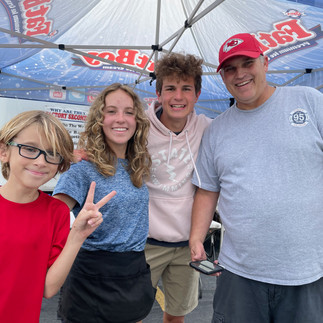Ice Cream Sandwich Seconds and River Trips: Adding Purpose to Your Grandparenting Adventures
- M. Winston (Winn) Egan
- Aug 16, 2022
- 4 min read

First, let’s begin with a BIG disclaimer. Not everything you do with grandchildren needs to be purposeful. There’s great value in just “hanging out” with your grandchildren—listening to what they have to say, enjoying spontaneous conversations and outings, and just having fun with them.
However, I think there is much to be gained from being intentional and purpose-driven in providing experiences and activities for grandchildren. Here are two illustrative stories about our attempts to make family activities more purposeful and meaningful for our grandchildren. We hope they’ll be helpful to you.
In our community, a savvy company sells ice-cream sandwich seconds, Fat Boy[s]. The sandwiches are seconds for a variety of reasons. They’re missing something—the top or bottom of the sandwich. Or the sandwich is incomplete in some fashion. However, they appear to be the same because of how they are packaged. If you were to look at the packaging, you would think there is nothing wrong with these sandwiches.
So, when the company sells them in our area, I buy a lot of them—sometimes 40 or 50. They are cheap. They taste great. And my grandchildren and our neighbors love them.
So, how did I use these sandwiches with my grandchildren and their parents? It was simple. At the end of a family dinner, I told the grandchildren I had a terrific dessert for all of them. I suggested it was a one-of-kind treat we’d never served before that evening. Of course, the grandchildren were very interested in the dessert. Take note! Curious grandchildren are more attentive when you are trying to make a point or teach an important life concept.
I removed my box of frozen Fat Boy[s] from our freezer. I then provided these instructions:
Quickly but carefully pull a treat from this box.
Carefully examine your treat before removing the packaging.
Then remove the packaging and see what you have inside.
Also, look around and notice what others have.
Then take a bite or two, and then we will discuss your observations.


Our grandchildren were quick to observe the differences among and between their sandwiches. At this “peak” moment, I asked questions like these:
Now that you’ve enjoyed your treat, how are these sandwiches like in your life?
How are they like your friends?
What do these sandwiches teach us about ourselves?”
What other observations do you have about these sandwiches?
Here are some of their representative comments:
· Life is full of surprises, and often the surprises are pretty good.
· All of my friends are different, even though they seem the same on the outside.
· You can’t know someone until you get past their packaging.
· You may think you know someone well, but you may not see what is inside them until you get to know them well.
· These tasted good even though they did not look right. Some things that do not look right are okay, even good.
· Sometimes, your feelings change after discovering something new about a person or situation.
Of course, the questions need to fit the needs and ages of your grandchildren. But I believe you will be amazed at what grandchildren say in response to simple experiences or more extensive, grandparent-sponsored events. Often, I’m surprised at their wisdom and insight. So are their parents!
There are a few things to remember when you engage your grandchildren and their parents in reflections—that’s what we call them.
· No putdowns.
· Every response or comment is welcome and valid.
· Show positive appreciation for observations shared.
· Ask open-ended questions like these:
What did we learn about ourselves from this activity?
What connections can we make between this experience and our lives?
What were the high points of this trip? And why?
What were the low points?
What frightened you the most, and how did you deal with your fear?
We believe these reflections help grandchildren make sense of their lives. Also, they connect their experiences with valuable principles and behaviors for enjoying meaningful lives.
Some, if not most of our activities, are explicitly planned and designed to achieve specific ends. We’re not merely giving our grandchildren something entertaining to do, but we are helping them to be reflective about their adventures and activities with us.
We want our grandchildren to experience the joy of serving others, discovering latent talents and attributes, the value of doing hard things, the enjoyment of contributing to worthwhile causes, and the thrill of achieving challenging goals—finishing a hike, summiting a peak, or completing a demanding task. We want them to connect the grandparent-supported activities to their growth as children, teenagers, and young adults.

About four years ago, we took all of our children and grandchildren on a two-day Colorado River Trip. It was full of adventure, learning, and challenges. Yes, it was packed with fun but rich with purpose—many purposes. These included learning to do hard things, working well with others, doing something new and challenging—not life-threatening, and connecting with aunts, uncles, cousins, and grandparents.


The river trip was chosen because of its inherent value in helping us achieve many worthwhile purposes. Yes, the trip was a blast and so much fun, but it was more than that. You want all or most of your activities to be more than fun and entertainment. You want them to teach, inspire, build, and connect your grandchildren to you, their cousins, and aunts and uncles.

Each night as we sat around a campfire or gathered to enjoy one another’s company, we reflected on our experiences. What did we learn or discover about ourselves? Or what did you learn about working together? What did we find out about others and their needs? What did we learn about being helpful? What did the river teach us? What are the eddies, rapids, currents, and deep waters in our lives? What new skills did we learn? How are we different because of our river adventure?
I hope these two examples have been helpful to you. Also, I hope your exposure to the use of “reflections” has been beneficial. Reflections are an exceedingly valuable tool or process for making your activities and events more purposeful and meaningful to your grandchildren and their parents.
As they say, the ball is now in your court. Please let us hear about your adventures in making your activities and events more purposeful and intentional. You can connect with us at grandparentingonpurpose.com.





























Comments